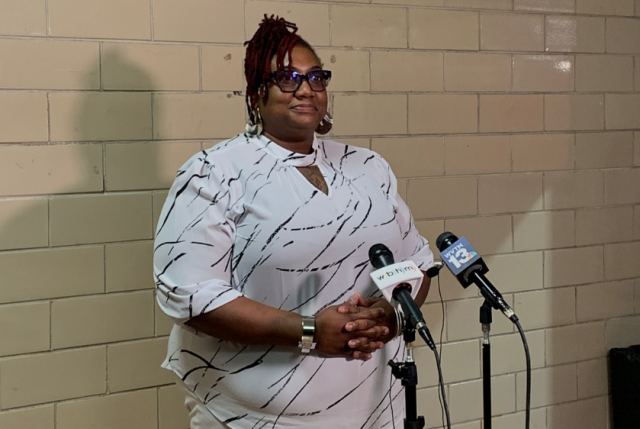
By Ryan Michaels
The Birmingham Times
Kimber Washington is a single mother of four, who works two jobs and lives in a home she owns in Birmingham’s Central Park neighborhood and is a former resident of both the Kimbrough Homes and Harris Homes public housing complexes. Being a single working mother is more than a full-time job, Washington said.
In March, she received her first check as part of the Embrace Mothers guaranteed income program, a pilot research initiative which gives 110 women within the city $375 per month for the next year.
Washington said that extra $375 each month has given her some “slack” in her regular budgeting, allowing her to occasionally not take a shift or pick up Captain D’s for dinner if she’d like.
“[The monthly payment] has allowed me to have a little more flexibility in terms of not having to work a shift here or there but not consistently, but if I needed a break, or I’m feeling a little extra exhausted or something of that nature, I’ve been able to kind of lax a little bit,” Washington said.
On Wednesday, Washington shared her story during a roundtable discussion that included Wendy Chun-Hoon, director of the U.S. Department of Labor’s Women’s Bureau, Mayor Randall Woodfin, local officials and others for a roundtable discussion on ways to reduce caregiving costs for women to ensure their ability to participate fully in the workforce.
Chun-Hoon said women who have to take care of children, elderly people or disabled people often have difficulty with career advancement because of their work outside of work.
“Caregivers, ourselves, we often make decisions about postponing that career advancement because it will mean more hours or shifting to a different job, because it will require us driving longer, and you can’t make that pickup,” Chun-Hoon said.
In addition, the cost of paying someone else to take care of people is “exorbitant,” and many who work as caregivers are not making the wages they deserve, Chun-Hoon said.
Mayor Randall Woodfin, who attended a portion of the discussion, used the first day of school coming up August 8 to illustrate the struggles of being a single mother.
“That Sunday night [before school], there will be some child…excited about school starting. They’re going to lay their outfit out that night, and they’ll probably sleep with it in their bed. They’ll be excited to either ride the bus or get dropped off at school. They’ll be excited to start school year, connect back with their friends that they’ve missed,” Woodfin said.
“If that child is [in] elementary school and possibly even in middle school, they won’t know the struggles that their mother is experiencing, having to choose between buying that outfit for school or paying that certain utility bill,” the mayor added.
The Embracing Mothers initiative is funded by a $500,000 grant from Mayors for a Guaranteed Income, a national group advocating for the implementation of guaranteed income programs.
The city chose to focus on single mothers because they make up about 60 percent of families with children in Birmingham, according to Amelia Muller, who is the civic design principal for the city of Birmingham. The “vast majority” of those single mothers are Black women, Muller said.
“We can’t support every resident in Birmingham with this [program], but we want to focus this on our most impacted population…when we think about the populations of greatest need here [single mothers] made total sense to us,” Muller said.
Washington, the single mother, agreed. She has two adult children and a 10- and 11-year-olds.
She works as a secretary at the University of Alabama at Birmingham’s (UAB) North Pavilion emergency room and as a secretary for West End Academy. All that means is that she’s busy.
“[Single moms] are on the jobs a lot of times,” she said. “We’re at the grocery stores. It’s rare that we’re in any other place that has nothing to do with… preserving our homes,” Washington said.



